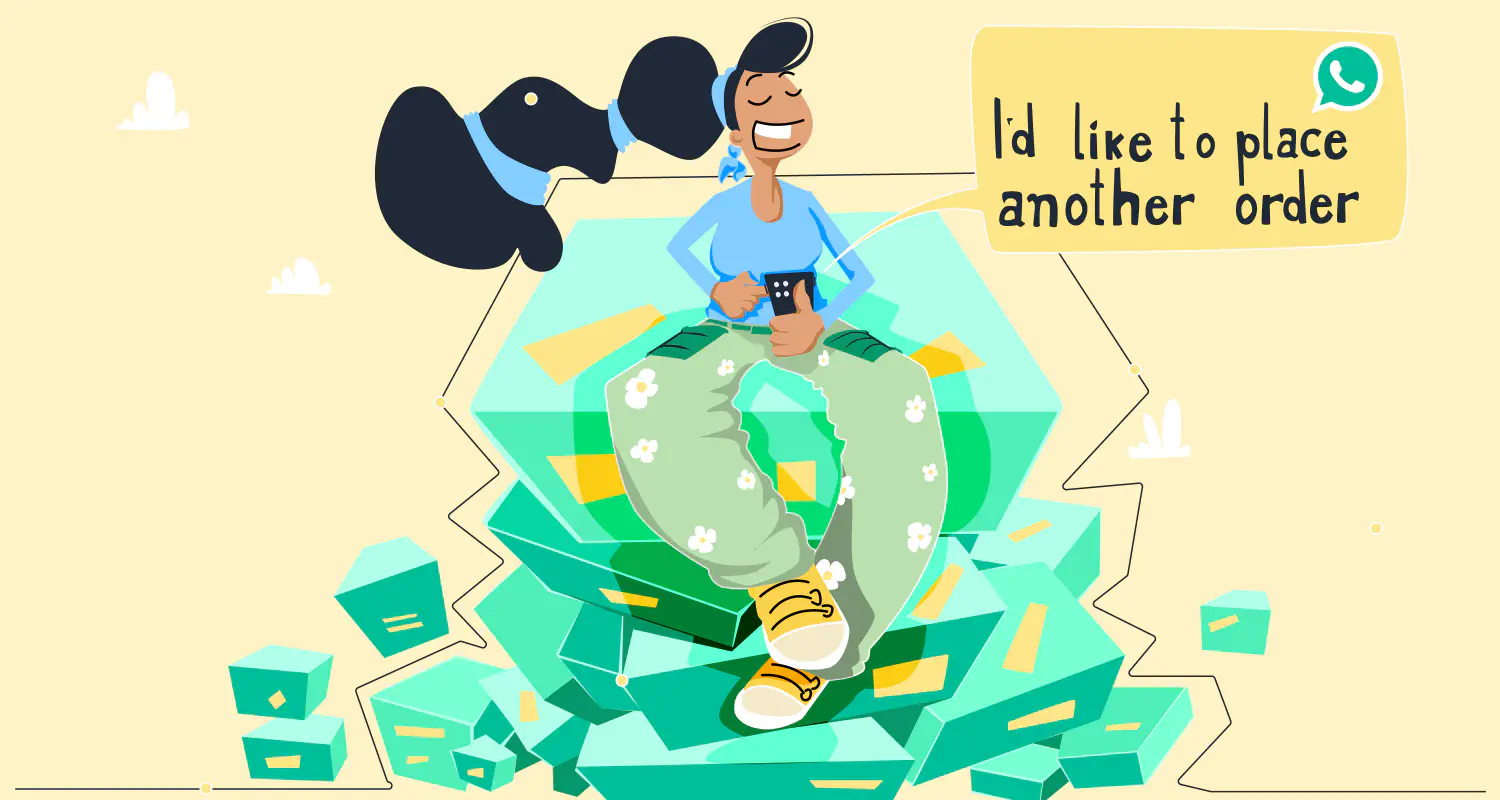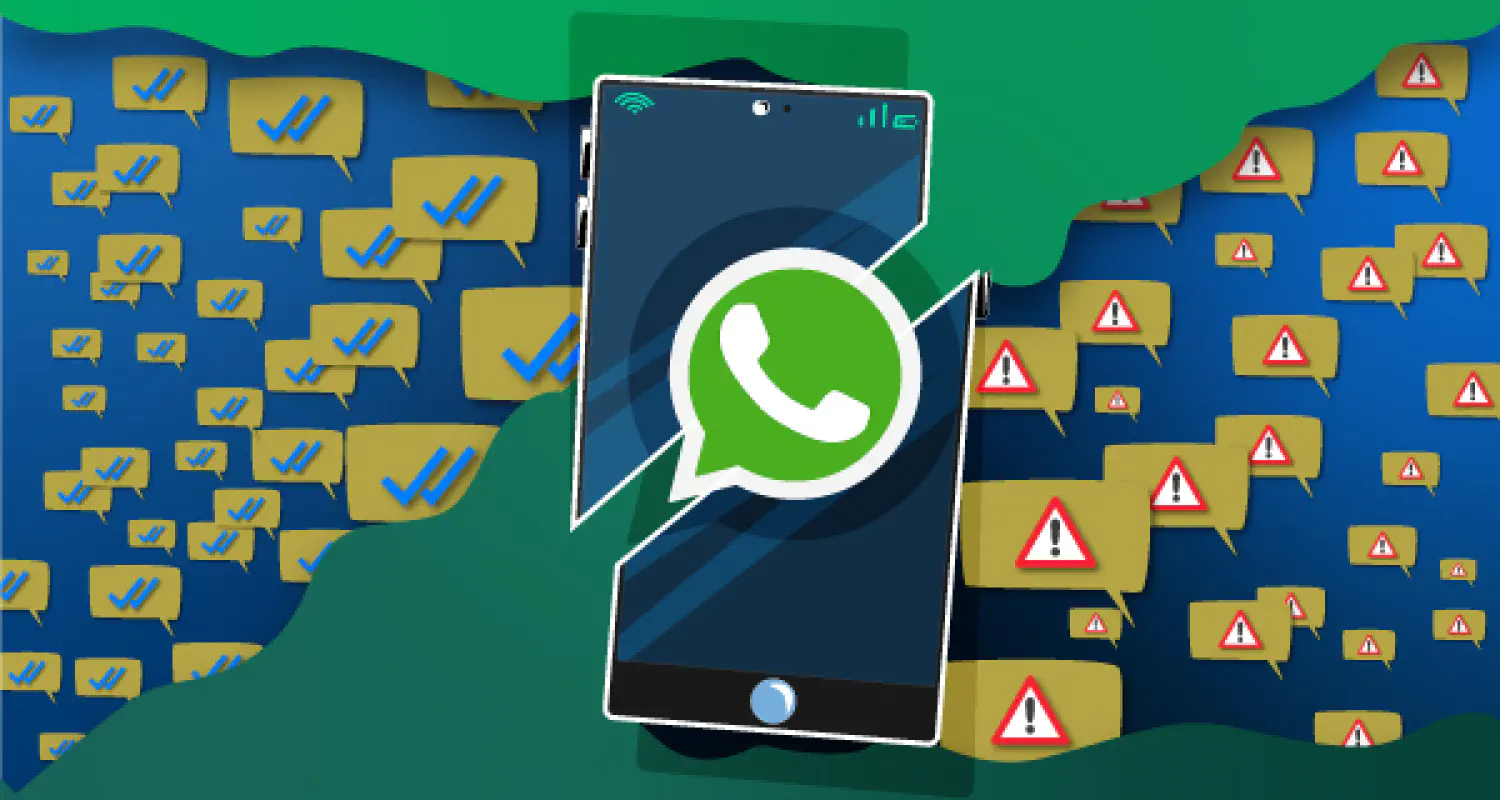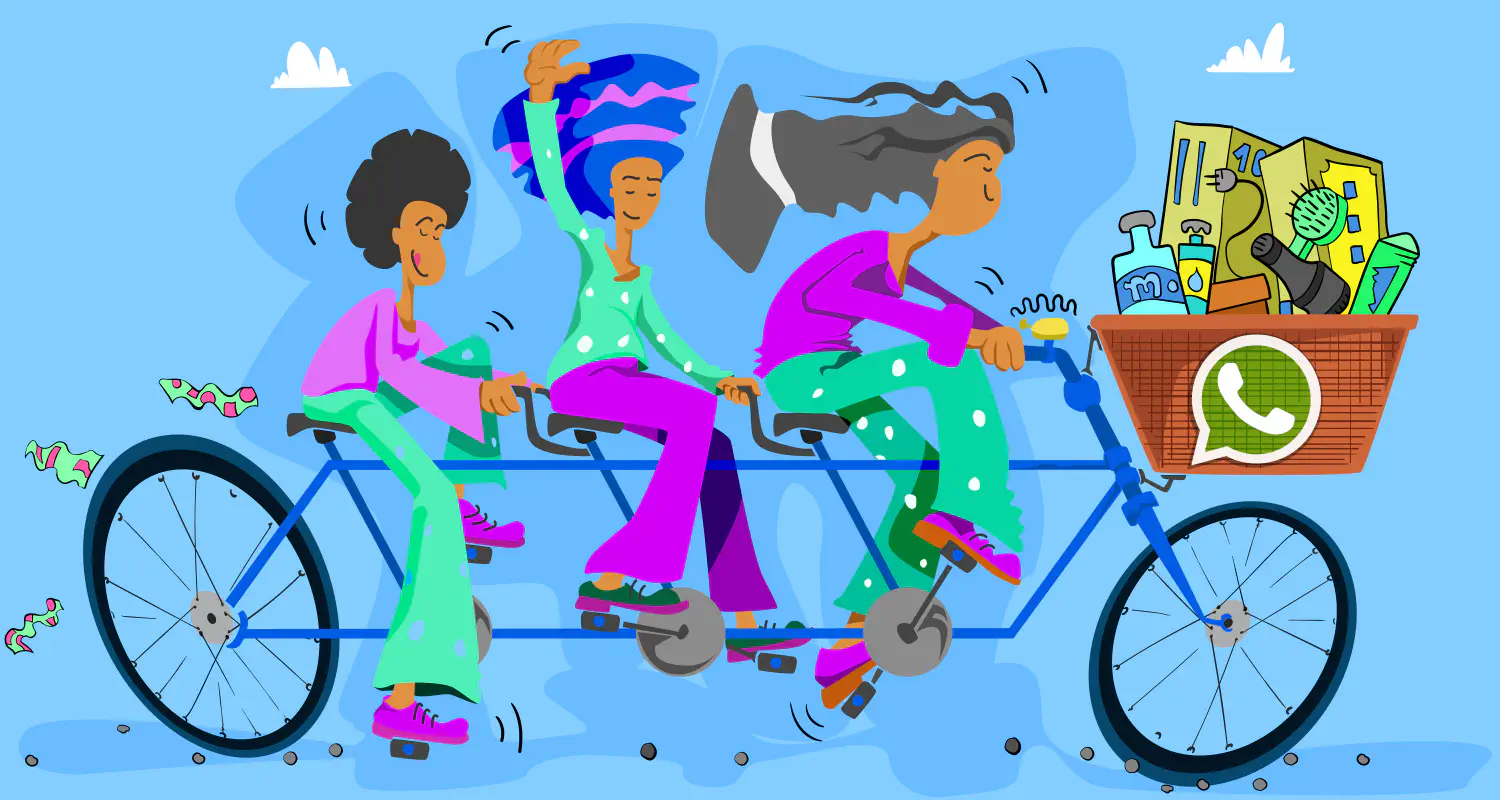The Full WhatsApp Marketing Guide for Businesses [2025]
![The Full WhatsApp Marketing Guide for Businesses [2025]](https://learn.rasayel.io/en/blog/whatsapp-marketing-guide/cover_hu3518757593868424594.webp)
Did you know that around 50 million companies worldwide are using WhatsApp for marketing purposes? Thanks to its massive reach and breakthrough promotional features, WhatsApp is quickly becoming one of the most exciting marketing channels.
In this guide, we’ll give you a comprehensive guide to start using WhatsApp for marketing and achieve great results. So, without further ado, let’s begin.
What is WhatsApp Marketing?
Before understanding how to use WhatsApp to market and advertise your products or services, let’s begin by defining the concept of WhatsApp marketing. It’s the interaction between brands and their existing and potential customers over their most used messaging platform. This interaction consists of sending promotional messages, sharing updates, or even facilitating transactions—all in an instant and conversational manner.
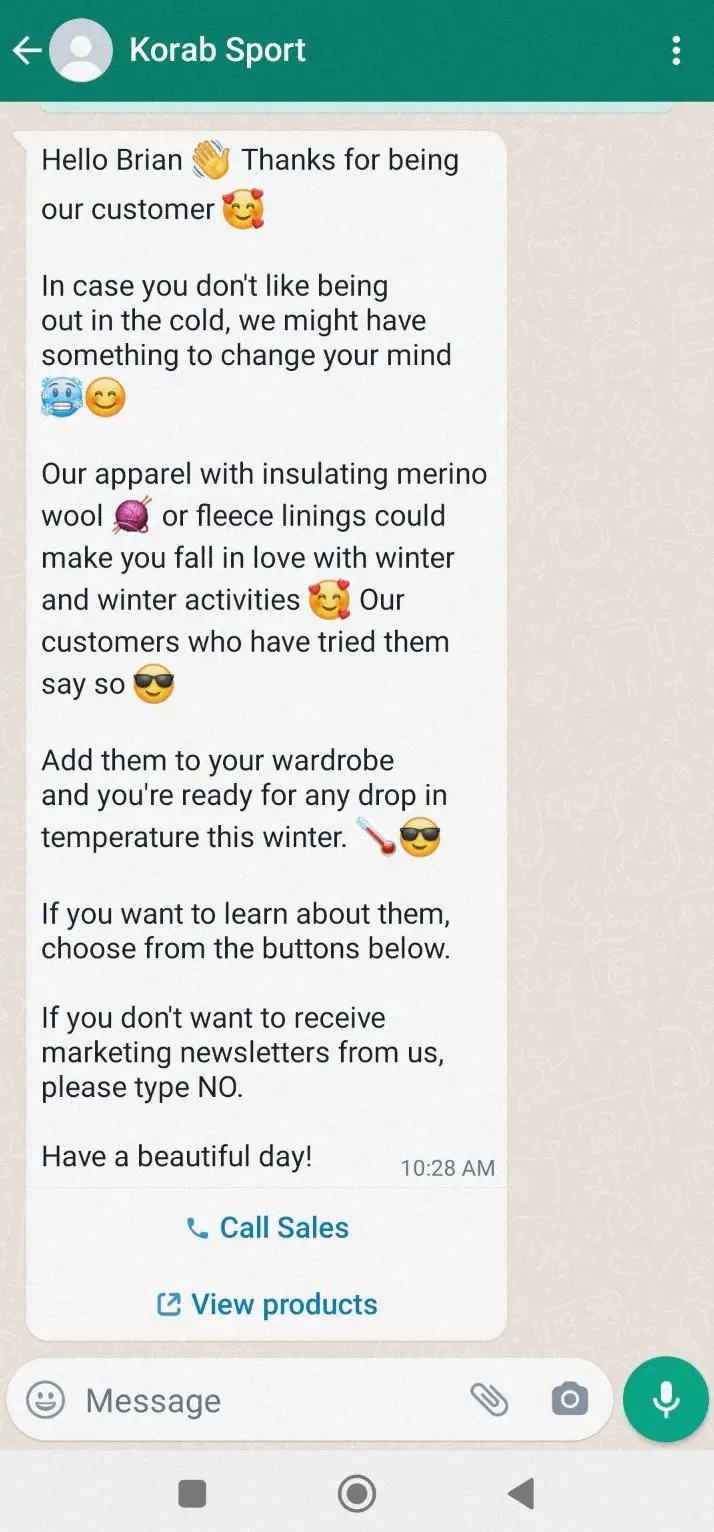
Marketers typically tend to use the WhatsApp Business Platform because of its extensive features. It gives the marketing teams the ability to automate messages using chatbots and also the ability to send bulk messages or campaigns in just a few minutes. WhatsApp really makes the marketing team’s life much easier and offers them a lot of benefits. So, let’s talk about a few of these benefits.
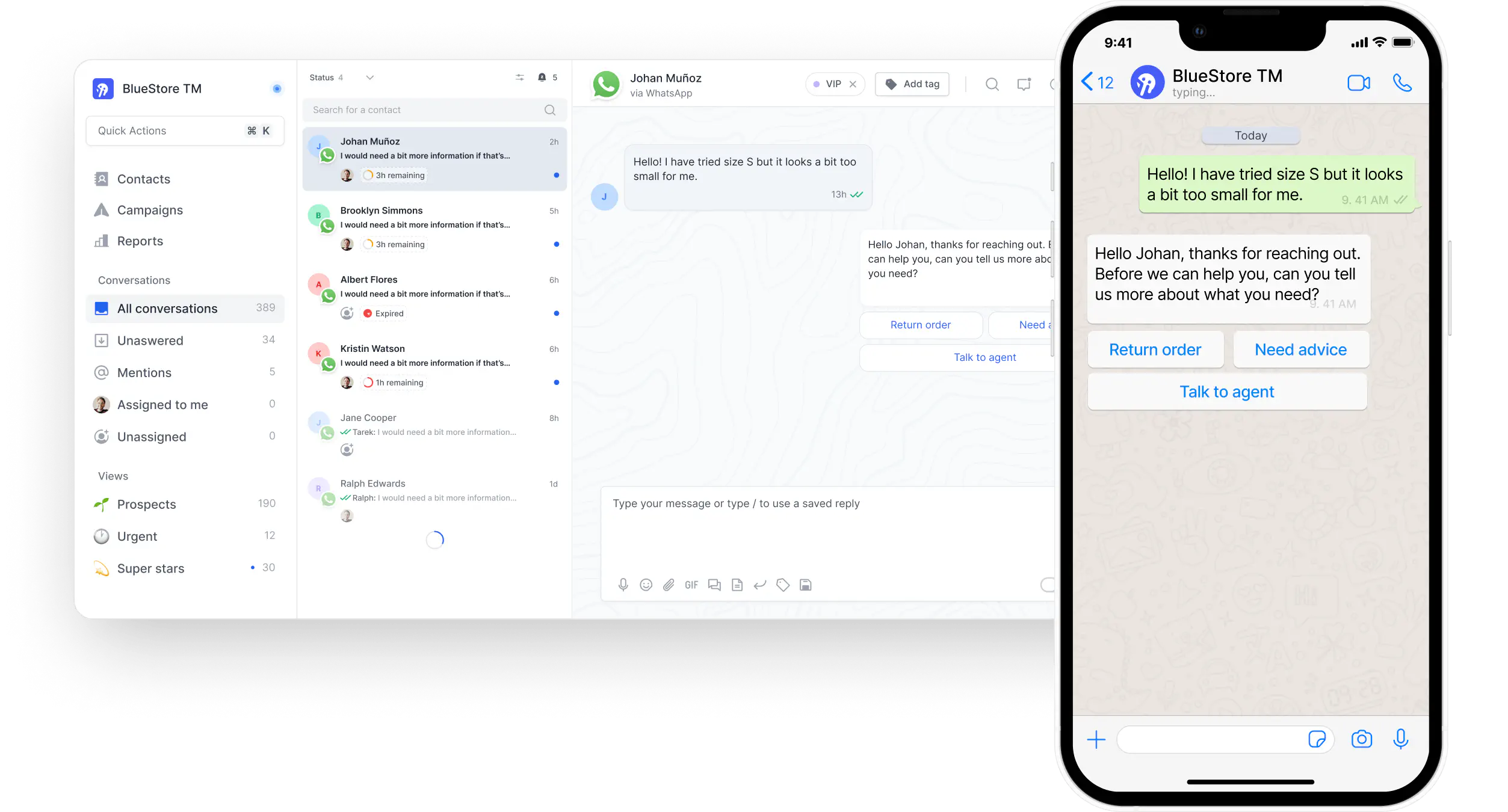
Benefits of Using WhatsApp for Marketing
Using WhatsApp for marketing is becoming more and more mainstream. You will find a lot of brands starting to incorporate WhatsApp into their marketing channels due to its many benefits and wide reach. But what else makes it so special? Here are some benefits to answer this specific question:
1. Direct communication
WhatsApp allows you to communicate directly with your customers, ensuring that your messages are seen and heard. Unlike emails that might get lost in crowded inboxes, WhatsApp messages have a higher open rate, making it a more effective channel for engagement.
2. Personalization
One of the key advantages of WhatsApp Marketing is the ability to personalize your messages. Your marketing team can easily personalize every message based on personal preferences and order history for example. Imagine what your customer will feel like if his favorite brand remembers specific details about him.
3. High engagement rates
With WhatsApp’s 98% open rate and 90-second average response time, businesses can expect higher engagement rates compared to other marketing channels. This immediacy and responsiveness can significantly improve the customer experience, leading to higher conversion rates.
4. Global reach
WhatsApp has an extremely large user base of over 2 billion users. Whether you’re targeting local or international audiences, it provides a line of communication to a divers demographic
5. Cost-effective
For small and medium-sized businesses, WhatsApp marketing is a cost-effective solution that doesn’t require a significant investment. The basic WhatsApp Business app is free, and even the WhatsApp Business API offers a scalable solution with manageable costs compared to other marketing channels.
How to Run a Successful Marketing Campaign on WhatsApp
To run a successful marketing campaign on WhatsApp, you need a strategic approach that aligns with your overall business goals. Here’s a step-by-step guide to help you get started.
Define your goal
Start by setting clear goals for your WhatsApp marketing campaign. Whether you aim to increase brand awareness, drive sales, or enhance customer support, having a defined goal will guide your strategy and help you measure success.
Grow your audience
You need to grow your audience using organic and paid methods in order to have a list to market to. This can be done by investing in paid ads to make customers opt-in to your WhatsApp broadcast list. Also, you can use organic methods like posting regularly on social media for example.
Personalize your message
Personalization is key to effective marketing on WhatsApp. Use customer data to tailor your messages, addressing recipients by name and offering content that resonates with their interests and behaviors. You also can segment your customer list based on behavior, demographics, product preferences to tailor your message even more and boost the engagement with your customers.
Use multimedia content
WhatsApp supports various multimedia formats, including images, videos, GIFs, and PDFs. Use these formats to create engaging content that captures your audience’s attention and delivers your message effectively.
Track your KPIs & optimize them
Track the performance of your WhatsApp campaigns using the reporting features to monitor metrics like open rates, click-through rates, and conversions. Use this data to refine your strategy and improve future campaigns.
Best Practices for WhatsApp Marketing
To make the most of your WhatsApp marketing efforts, follow these best practices:
1. Obtain Consent
Before you start sending messages, ensure that you have obtained explicit consent from your contacts. This is not only a legal requirement but also helps build trust with your audience. This can happen when they opt-in on WhatsApp to be part of your newsletter or messaging list. Make sure you ask them explicitly for consent to be able to safely message them when you want.
2. Respect Privacy
WhatsApp is primarily a personal communication platform, so it’s important to respect the privacy of your customers. Avoid bombarding them with messages and always provide an option to opt out.
3. Provide Value
Every message you send should offer value to the recipient. Whether it’s a special offer, useful information, or a helpful tip, make sure your content is worth your customers’ time.
Now let’s touch on how to execute the marketing strategy itself from start to finish.
How to Execute a WhatsApp Marketing Strategy
Running a successful WhatsApp marketing strategy requires a well-structured approach that guides your customers through the marketing funnel—from awareness to retention.
Your marketing team has to design the customer journey before they start investing money and effort into executing. In order to execute a marketing strategy effectively, your team has to know exactly how to move customers through the funnel and maximize the lifetime value of customers. In this step-by-step guide, I will tell you exactly how to achieve that using WhatsApp.
1. Awareness
This is the phase when you need to grab the attention of your customers. They are basically a cold audience right now. All you need to do is run social media ads that allows you to start a WhatsApp chat with them. Here is how to do it:
You can use platforms like Facebook and Instagram to launch Click-to-Chat ads that drive traffic directly to your WhatsApp chat. This allows potential customers to engage with your business instantly, increasing the chances of conversion.
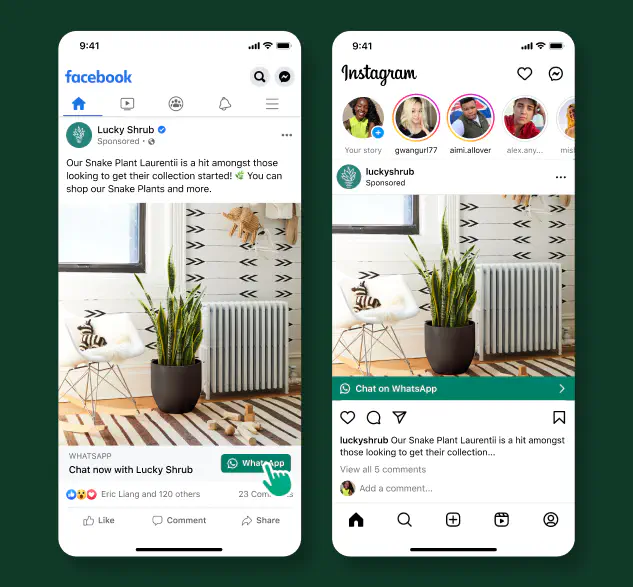
Another way of grabbing the attention of your audience is to share WhatsApp links or QR codes across your channels to make it easy for customers to start a conversation with your business. These links can be included in emails, social media posts & your website.
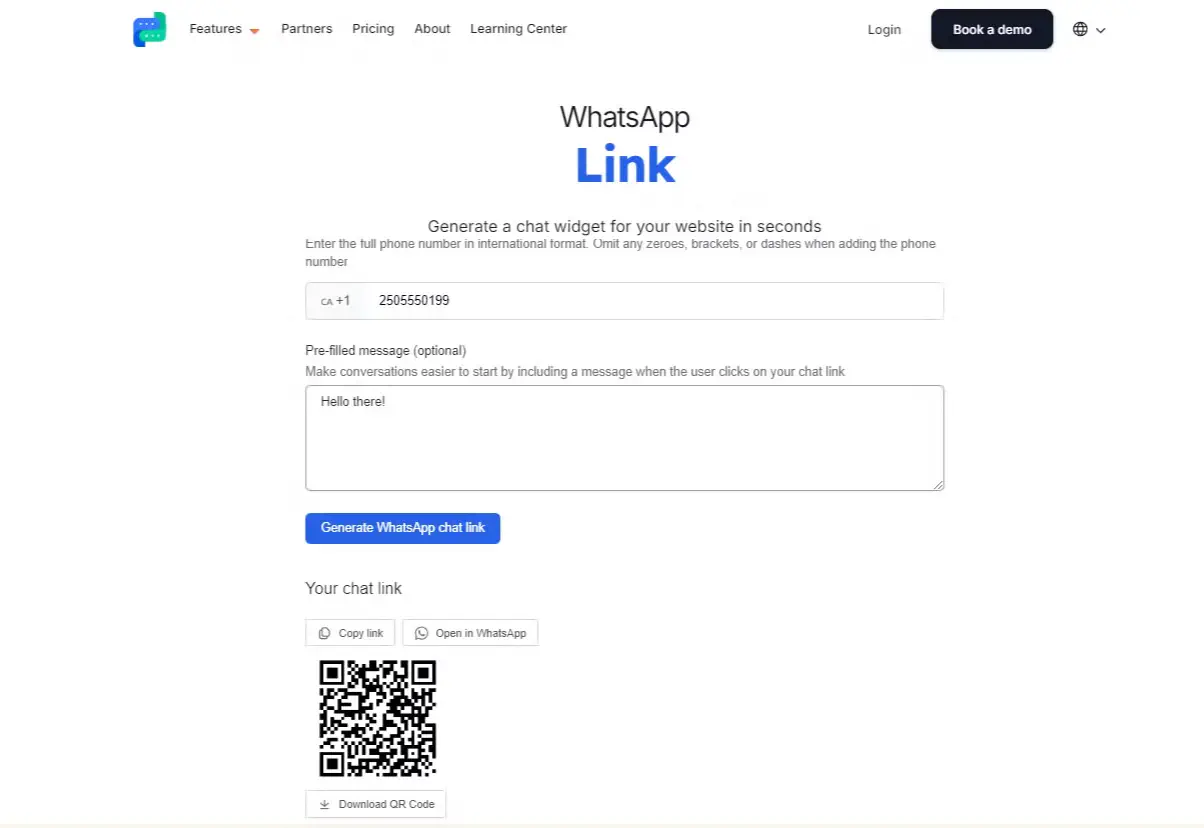
2. Interest
Now once they are in the broadcast list, start sending personalized messages to segments of your audience. You can do that using message templates that are pre-approved by Meta. This helps maintain engagement by delivering relevant content to the right people.
3. Consideration
If you’ve been in marketing for long enough, you know for sure the majority of your audience won’t buy from the first ad they see. That’s why retargeting campaigns are so effective. folks who’ve seen your ad are considering your product, but they are still on the fence. So, how can you convert them?
Run retargeting campaigns to reach out to customers who have shown interest in your products or services but haven’t made a purchase yet. Personalized follow-up messages can help nudge them toward a decision.
4. Conversion
At this stage prospects have shown interest, all you need to do is convert them to paying customers.
Adding WhatsApp chat buttons to your website to facilitate direct communication with potential customers. This can help address any questions or concerns they have, ultimately increasing conversion rates. Here is an example of this WhatsApp button on Rasayel’s landing page.
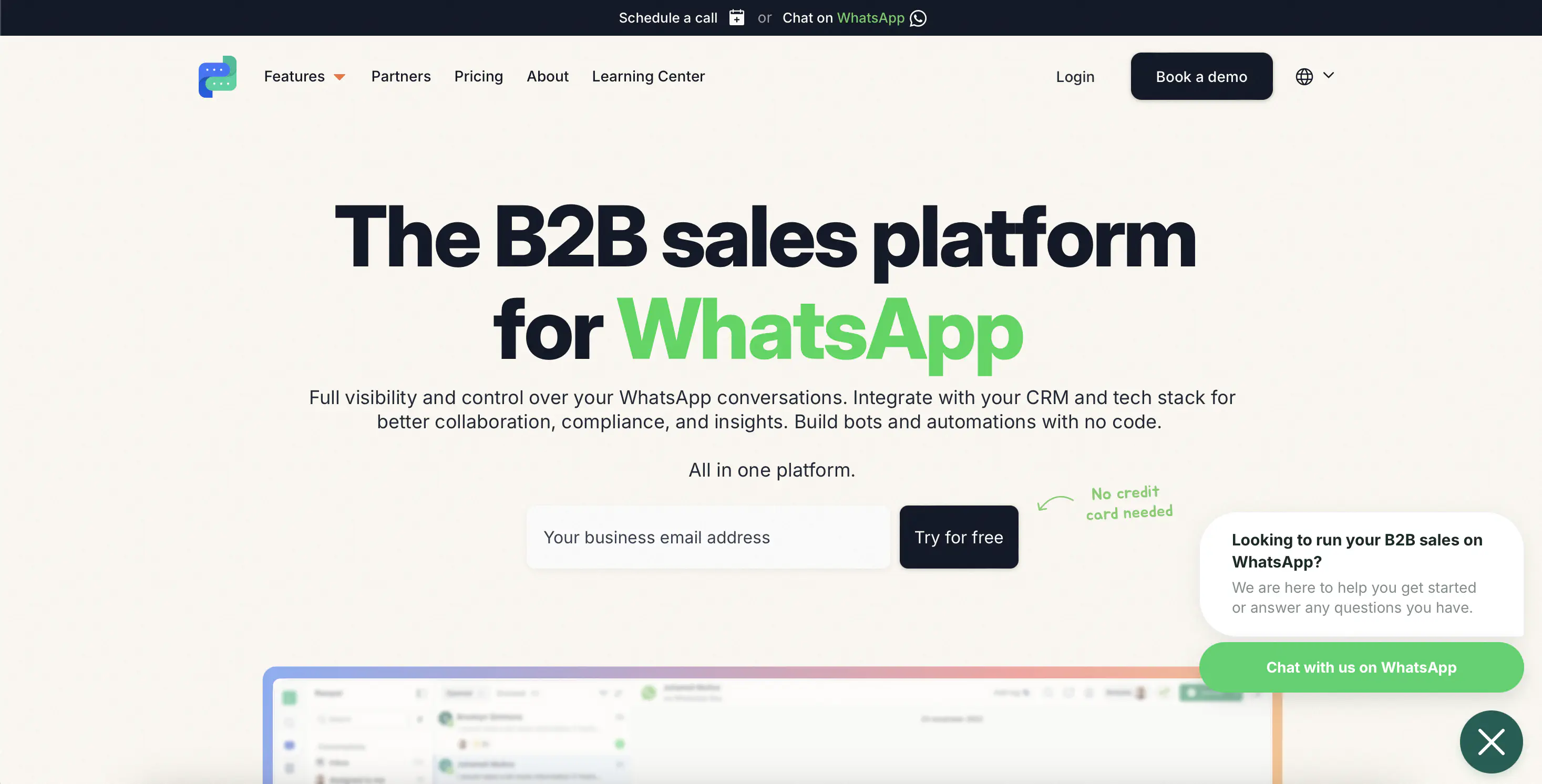
5. Retention
This is the last stage of the funnel, but it’s far from the end. You need to retain your customers and make them repeat their purchase time and time again.
One of the ways to do that is to use WhatsApp to send automated alerts and reminders, such as order confirmations, delivery updates, and appointment reminders. This keeps your customers informed and engaged, contributing to long-term retention. All these messages can be sent using a chatbot that can be built with zero lines of code. So, any marketing intern in your team can set this up in a few minutes.
Another way of retaining your customers is to start a newsletter on WhatsApp that sends customers updates on new products you’re launching. This way you make sure your personal connection with them is going to last and at any point they can buy again.
Now that was a lot! If you made to this section, congrats! You’re on your way to executing a killer marketing strategy.
Notable Companies Using WhatsApp for Marketing
We all are searching for proof and examples to be inspired by. Some may question how effective can all of this be. That’s why we are going to talk about these companies. Big companies who are doing exactly what we discussed above in the previous sections and achieved remarkable results doing that. To showcase what is possible to achieve using WhatsApp for marketing, let’s take a look at these notable companies using WhatsApp for marketing:
E-commerce and retail
- Estée Lauder: Offers personalized skincare advice through Liv, an AI chatbot.
- Yoox: Utilizes WhatsApp to provide personalized shopping experiences and drive sales.
- Flipkart: Uses WhatsApp for customer support and marketing campaigns.
Food and beverage
- Absolut Vodka: Engages customers with interactive quizzes and exclusive content.
- Hellmann’s Mayonnaise: Offers recipe inspiration and cooking tips.
Travel and hospitality
- ADAC: Provides roadside assistance and travel information.
- S-Bahn Munich: Runs contests and promotions.
Healthcare and wellness
- Dermalogica: Offers skin consultations through WhatsApp.
- Physics Wallah: Provides educational content and tutoring services.
Other industries
- Bain & Company: Uses WhatsApp for internal communication and collaboration.
- Tata Motors: Provides customer support and updates.
These are just a few examples of companies that have successfully incorporated WhatsApp into their marketing strategies, and there are many more examples of companies too. So, are you ready to join them?
Conclusion
To sum it up, we covered almost everything you need to know to start doing marketing on WhatsApp. We discussed what is WhatsApp marketing, its benefits, and how to run a successful marketing campaign on WhatsApp. We also touched on the best practices to keep in mind when marketing on WhatsApp, and how to execute a killer marketing strategy using WhatsApp from start to finish.
WhatsApp Marketing offers a powerful and personal way to connect with your customers. By leveraging its features and following best practices, you will be on your way to executing a successful marketing strategy. So not only you will be increasing the conversion numbers, but you will also do that using a personal way that builds your relationship with your audience.
Frequently Asked Questions
The WhatsApp Business API is more of a customer relations tool for companies as its use case is not for marketing. Here are key reasons why it may not be ideal for marketing: Here are key reasons why it may not be ideal for marketing:
- Strict Rules Against Promotional Messaging: This article also shows that WhatsApp’s policies restrict the deployment of commercial communications. The platform allows only transactional and/or support-related messages but sending any form of Marketing Message will attract penalties or suspension of the account. 2. High Costs for Outbound Messages: WhatsApp Business API also comes with a cost, where charges are made on per message basis which makes marketing which entails sending of many messages to the general public costly to organizations as compared to other methods such as emails and Short Message Service (SMS). 3. Opt-In Requirement: Thus, WhatsApp requires the user to agree on receiving a message deliberately. This can also slow the process of accumulating a list of marketing prospects as compared to other platforms that do not require much scrutiny in the opting-in process. 4. Limited Features for Campaigns: Compared to other marketing platforms, WhatsApp does not have a lot of features to support marketing automation such as segmenting an email list, tracking and A/B testing.
To create a successful WhatsApp marketing plan, you need to follow these steps:
- Define goals: Clearly outline your goals of using WhatsApp marketing (e.g., to attract customers’ attention, to receive leads). 2. Know your target audience: In order to effectively create the right content for your target audience, it is crucial to define the target audience that you are going to attract on the WhatsApp platform. 3. Content Strategy: Determine what type of content will you send and how it’ll benefit recipients (e.g., special tips, promos, product demonstrations). 4. Opt-in Strategy: Make sure the users subscribe to the marketing channels such as through signup for an application on the WhatsApp webpage, and sign up on WA marketing within stores. 5. Integrations: Seek for tools like; WhatsApp Business API. The API allows you to build chatbots in order to handle the conversations and broadcasts at large. 6. Measurement & Optimization: Not only open rates and message replies but track any other metric and change the approach if needed.
Learn more
If you'd like to learn more about how WhatsApp can help you grow your business, please reach out to us on WhatsApp at +13024070488 (Click to chat now).
We also offer a free consultation session where we review your use case, answer any questions about WhatsApp, and help you build a strategy to make the best out of the platform. Book a call with us here. We'd love to speak with you:
Book a call: Europe, the Middle East, and Africa
Book a call: LATAM
Curious about Rasayel? Schedule a demo today.

Omar Nabil, a former programmer, discovered his passion for writing while working on websites. Combining analytical thinking with creativity, he crafts brand stories that emotionally resonate and inspire action.

